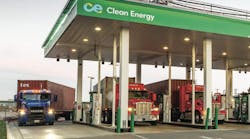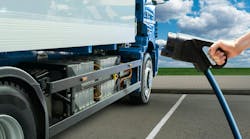Between the Environmental Protection Agency (EPA), the Department of Transportation (DOT) and the Occupational Safety & Health Administration (OSHA), fleets are inundated with rules and regulations they must comply with to operate in a safe and legal manner. Then there are also state and local compliance ordinances.
Large fleets often have a person on staff whose sole job is to ensure that the fleet complies with all safety and health regulations. At small to mid-size fleets and at private fleets, compliance may be only one of many responsibilities that a person has to juggle with other duties.
In just one area — the transporting of hazardous waste — there can be myriad permits necessary as many states have their own permitting process. Failure to be properly permitted can mean fines, but in some areas, the consequences are more severe. In Wyoming, for example, there is a port of entry where if hazardous waste permits have expired, the truck will be put out of service (and will stay out of service) until the proper permit has been secured. That process could take hours and could result in a missed delivery window.
One way to gain control over your compliance is to outsource it to a third party. They will assume responsibility for ensuring that you have all the proper permits and insurance certificates and any other information needed for getting a permit. They will also assist you with putting procedures in place for the proper storage and disposal of EPA regulated materials.
When selecting a supplier to handle your compliance, look for one with experience in the areas where your fleet travels. You want to work with someone who is up to date — not only on national regulations — but on state and local regulations as well.
They should keep a checklist of all the permits you need and the dates when those permits need to be renewed. They should also be able to demonstrate that they have successfully managed the permitting process in the past. In addition, this third party partner needs to allow enough time for the permit request to be processed and to gather additional material should that be required by the agency issuing a permit.
The goal of outsourcing compliance is to ensure your trucks run smoothly without any stoppages resulting from (1) failure to comply with regulations and (2) your having to devote internal resources to the effort. Giving the responsibility for compliance to someone else allows you to concentrate on what you do best, whether that is baking bread or delivering goods for others.


